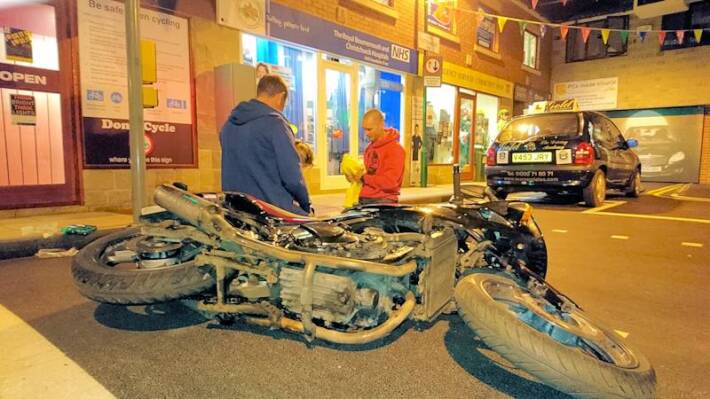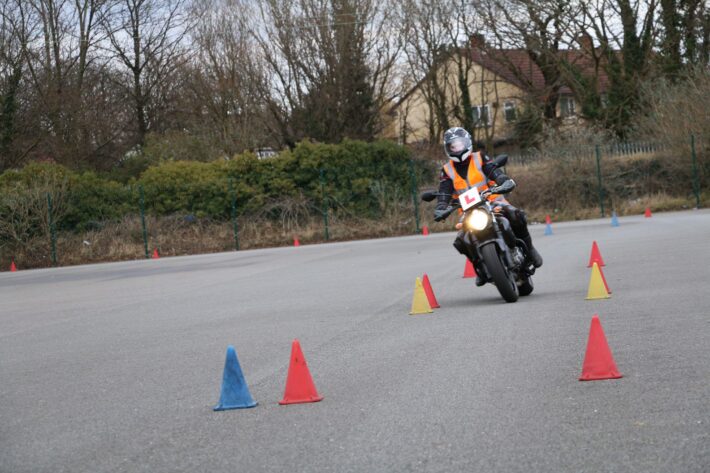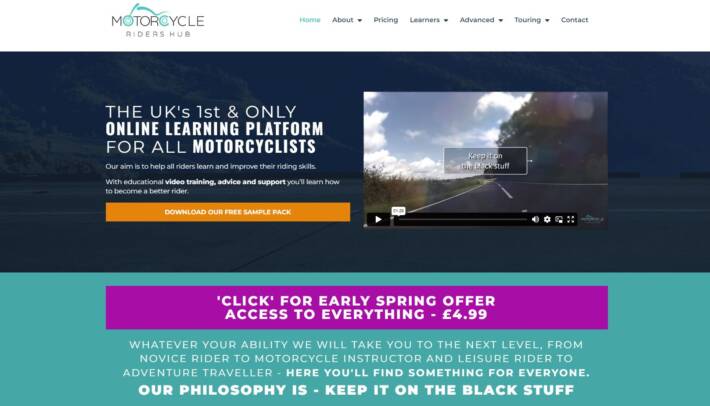Simon Hayes is the founder of Motorcycle Riders Hub, the UK’s first and only online learning platform for new and existing motorcyclists. Before that puts you off reading any further, you should know that this is a training school with a difference and could be crucial in helping you make a life saving decision.
Simon tells it like it is in very simple terms. His job is to help riders learn and improve their skills so they can avoid being killed on their motorcycle. He does so by providing educational videos, advice and support that go far above and beyond what’s taught as standard.
He believes that there are major flaws in the current motorcycle training industry, which often sees hobbyist bikers becoming instructors with little experience in teaching. As a result, people are taught how to pass a test, rather than how to ride a bike effectively.

“Although I have been riding motorcycles since 1985, I’m an instructor at heart, not a biker,” explains Simon. “My forte is training and teaching people how to ride better. I spent 13 years in the army instructing people on various skills, from HGV driving to biking.
“When I left the army in 1996, I set about developing a methodology of motorcycle training that helps people understand what the bike is doing and how to respond to that feedback. It enables them to go through the process properly and learn properly, so that they don’t die.”
Simon established a very successful training school that gained a reputation for excellence, but he soon realised that it was limited by geography and the distance people were willing to travel for training. Hence, he came up with the idea of an online training facility.
Motorcycle Riders Hub has two very specific target markets – one being learner riders and the other being existing motorcyclists who want to hone their skills and become a better, safer rider. The latter are invited to join the Hub’s Advanced Academy.
“Bikers often hear the word safer and assume that means boring”, explains Simon. “We’re a community of thrill seekers, we like living on the edge and that doesn’t sit well with the perception of traditional advanced rider training as old fashioned and dull.
“But when we say safer, what we mean is developing your skills to a much higher level and riding with less risk by understanding what you are doing on the bike. Safer means you are a better rider, a more skilled rider. It makes your riding experience more enjoyable.”

An annual fee gives motorcyclists access to over 40 hours of training content in the form of videos, podcasts, e-books, quizzes and advice. It’s delivered by a team of highly experienced instructors and is also overseen and vetted by a panel of independent ex-police riders.
There is no course timeline or strict syllabus, so members can dip in and out at their own pace, choosing the areas they’d like to focus on, be it better cornering, the perfect overtake or learning how to control a motorcycle at slow speeds.
“A lot of people just go out and ride aimlessly,” says Simon. “They’re on autopilot and they don’t know how they got from A to B. With the Advanced Academy, you are working on your craft, just as any other sportsperson would with their sport.
“For example, if you’re going out to practice cornering today and you’ve got a better understanding of that, you can select your rides and your routes in order to practice the skill that you want to develop. Your riding has more purpose.”
As the last dregs of winter fade away and Spring brings Britain’s bikers back to the roads in force, there is no better time to join Motorcycle Riders Hub’s Advanced Academy and take your first steps on the ladder to becoming a better rider.
“Spring is prime time for motorcycle accidents,” explains Simon. “The majority of us have been hibernating for the colder months. We’re rusty, our bikes are rusty and other road users have become accustomed to driving without us on the road.”

So, as an expert motorcycle riding instructor who has seen his fair share of uneducated and unskilled riders through his doors, what are his top tips to avoid ending up in the hospital – or the morgue – this Spring? Simon Says:
- Do recognise skill fade
“If you don’t use it, you lose it. People put their bikes to bed in the Autumn and six months later they emerge from their cocoon thinking they’re the same rider, but they’re not. The fact is they will almost certainly be a worse rider now than they were then.
“Those early weeks out of hibernation are the most dangerous. Remember: cold tyres, cold roads and cold bodies. You are not the same rider you were in September. Allow yourself time to build your skills back up and be hyper aware of what you’re doing in the meantime.”
- Don’t be arrogant in your ability
“Actual ability and perceived ability are two very different things, and they don’t often match. In our experience, people’s perception of their own riding ability is often horrendously high compared to their actual ability, which is horrendously low.
“Just because you ride fast, doesn’t mean you are a good rider. Speed doesn’t equal ability or skill. Arrogance in thinking you are a better rider than you actually are leads to accidents and deaths on the roads. Realise what your ability levels are and stay within them.”
- Do stay local
“Start off with short rides in your local area. Don’t go off on a 300-mile ride on your first journey because you’re going to get physically and mentally tired. Bike fitness is a thing, and as with any fitness, it needs to be built back up over time.
“If you set out on a long ride, chances are you’ll be absolutely knackered halfway back and that’s when concentration lapses and accidents happen. Even the most experienced of riders who ride long distance frequently still get fatigued, so know your limits.”
- Don’t try and impress your mates
“Don’t get sucked in to competing with your mates on a group ride. That’s a big problem and gets a lot of riders into trouble. Riding in a group is an entirely different thing to riding alone and anyone doing so should research how to ride in a group properly.
“To put it in perspective, I liken motorcycling to golfing. If I was playing golf with a mate, I’d want to know their handicap. It’s the same with riding. Know the ability of those in your group, adjust your riding accordingly and don’t act like Rossi trying to impress your mates.”
- Do THINK CAR
“Forget THINK BIKE; as a motorcyclist you need to THINK CAR. Motorcyclists account for just 1% of traffic, so 99 times out of 100, a car driver isn’t looking for a motorcycle, they are looking for another vehicle.
“In the winter, we account for even less than that, so come Spring, when we all head back out on the road in droves, drivers aren’t used to seeing us and sharing the road with us. You must be extra vigilant in the early weeks of Spring and Summer to avoid being hit.”
Join the Motorcycle Riders Hub today
Motorcycle Riders Hub is currently running a Getting Back on Your Bike Spring Offer, giving full access to the Advanced Silver programme for just £4.99 a month with no contract (usual subscription price is a one-off fee of £79.99). The offer is available until the end of April.
“This is a brilliant price for access to a wealth of education and training that’s simply not available elsewhere,” says Simon. “Look upon it as an investment in your motorcycling skills, so you can impress mates for all the right reasons, and more importantly, you can stay alive.”
For more information or to sign up to Motorcycle Riders Hub, visit https://motorcycleridershub.co.uk/
4 comments on “Stay Alive, Think Car!”
Many rider don’t understand about muscle memory. If one rides a lot ones muscles become accustomed to certain actions and reaction to things that we regularly do and/or want them to do. That can obviously include reacting to dangerous circumstances. So the muscle becomes used to doing certain things. Things that perhaps we take for granted but are useful in order to keep us safer on our journeys. Actions that our bodies make without us consciously thinking about it. Of reacting when we recognise a potential danger before we have cognitively decided what to do about it.
.
Muscle memory comes into play if we want it to or not. When we are perhaps faced with a new but difficult situation muscle memory can help us to avoid or mitigate dangerous circumstances. It’s as if we are on auto pilot sometimes.
During the winter if we don’t ride out at all we not only lose our cognitive memory but the same happens to our muscles and so its important to recognised muscle memory. To start over again training our mind and bodies and regaining that memory. Slowly and then in time we re build up not only our conscious memory but also our muscle memory and become hopefully, the capable rider we once were the year before.
Sometimes muscle memory can work against us. By training and being repetitive under certain conditions and sometimes ones of danger where we need to react fast our muscles might react quicker then our cognitive abilities and place us in perhaps a greater danger.
I can speak of braking to a stop either at lights or in queues with no real increased danger or then in an emergency situation . Under all braking say to a halt we should always use both rakes for greatest effect. When approaching such a circumstance its normal to train to cover both both brakes in order to activate them as soon or sooner rather than later. This is the norm for all or most braking to a stop.
However there is a circumstance where we don’t want to even touch or cover the front brake. To snatch or be too soon on using the front brake. That is when going slowly and turning say on a bend , at a junction or other slow turning manoeuvre. If during turning slowly and covering both brakes and one pulls even slightly on the front brake gravity takes over and we can fall over and fall off. This is is something we obviously we don’t want to do at any time let alone in traffic.
So if turning slowly consider not covering the front brake and use speed and ones rear brake only to slow down with. That way we will not lose traction on the front wheel.
One thing that many don’t think of. If you are leaving your bike on concrete or tarmac overnight or over the winter get the wheels off that surface or it will deteriorate/ distort your rubber/compound. Place your bike on a carpet or rug or even wood as an insulator and they will stay fresh and will not distort. make sure they are fully blown up and not losing pressure as that means eventually that as the tyre goes down the sidewalls will distort and never come back into shape. Just a little advice on keeping your bike safe during the winter. Advice on tyres ok.
The best advice I can give is not ‘think car’ its always THINK SPACE Spatial awareness is vitally important on the road as we are so vulnerable on a bike. Car drivers etc are far less vulnerable, thy are well protected all round by metal, by front and rear areas that absorb impact stresses. of air bags that protect vital organs and life itself and of seat belts that stop one from being thrown around like a rag doll.
A motorcyclist has no such protection and when one comes into contact with a solid object be it a car or brick wall the body will always come worse off.
So its vitally important that we give as much safe space as we possibly can to all and everything around us on the road. It doesn’t matter if we are following it or its beside us or directly in front of us and heading our way. Cars and other vehicles are a potential danger so give yourself enough safe space to avoid them and by doing that and by being as far away from others as possible we will be seen by others and that enables them to also see us early and avoid hitting us and us them..
By simply the giving of SAFE SPACE its a WIN WIN situation all round. Never ever hide yourself for others, Not behind that bus or transit van or HGV or big electric cars with blackened windows, make sure that your positioning is always right for the circumstances of the road ahead.
Sometimes we appear to be alone so we may feel that we are indestructible but not for long. The other day on a country road I was doing about 30 mph when on two occasions I was confronted by oncoming vehicles . One was a car on a very narrow almost single track road that was to my mind going far too fast on a slight bend and I just made it squeezing past him by the inside verge. He never braked at all. I only had time to throttle off, cover the brakes and breath in. The other was a 3.5 ton lorry well over on my side of the road taking up some 3/.4 of the full road width. I was doing 40 mph and again managed to squeeze past him I saw no active avoidance for him either.
These two circumstances were on 60 mph country roads but it was obvious from the start that a much slower speed would give me greater safety. Good job I was not making faster progress as I see some do. It did however rattle me to think that either of those circumstances could have been the end of me or my riding career.